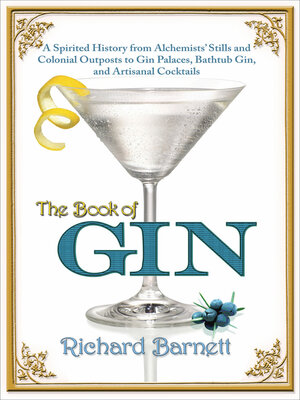The Book of Gin
ebook ∣ A Spirited History from Alchemists' Stills and Colonial Outposts to Gin Palaces, Bathtub Gin, and Artisanal Cocktails
By Richard Barnett

Sign up to save your library
With an OverDrive account, you can save your favorite libraries for at-a-glance information about availability. Find out more about OverDrive accounts.
Find this title in Libby, the library reading app by OverDrive.



Search for a digital library with this title
Title found at these libraries:
| Library Name | Distance |
|---|---|
| Loading... |
“An absorbing popular history of one of history’s most popular drinks.” —Booklist
Gin has been a drink of kings infused with crushed pearls and rose petals, and a drink of the poor flavored with turpentine and sulfuric acid. Born in alchemists’ stills and monastery kitchens, its earliest incarnations were juniper flavored medicines used to prevent plague, ease the pains of childbirth, and even to treat a lack of courage.
In The Book of Gin, Richard Barnett traces the life of this beguiling spirit, once believed to cause a “new kind of drunkenness.” In the eighteenth century, gin-crazed debauchery (and class conflict) inspired Hogarth’s satirical masterpieces “Beer Street” and “Gin Lane.” In the nineteenth century, gin was drunk by Napoleonic War naval heroes, at lavish gin palaces, and by homesick colonials, who mixed it with their bitter anti-malarial tonics. In the early twentieth century, the illicit cocktail culture of Prohibition made gin—often dangerous bathtub gin—fashionable again. And today, with the growth of small-batch distilling, gin has once-again made a comeback.
Wide-ranging, impeccably researched, and packed with illuminating stories, The Book of Gin is lively and fascinating, an indispensable history of a complex and notorious drink.
“The Book of Gin is full of history that will make you grin . . . An enchanting read.” —Cooking by the Book
Gin has been a drink of kings infused with crushed pearls and rose petals, and a drink of the poor flavored with turpentine and sulfuric acid. Born in alchemists’ stills and monastery kitchens, its earliest incarnations were juniper flavored medicines used to prevent plague, ease the pains of childbirth, and even to treat a lack of courage.
In The Book of Gin, Richard Barnett traces the life of this beguiling spirit, once believed to cause a “new kind of drunkenness.” In the eighteenth century, gin-crazed debauchery (and class conflict) inspired Hogarth’s satirical masterpieces “Beer Street” and “Gin Lane.” In the nineteenth century, gin was drunk by Napoleonic War naval heroes, at lavish gin palaces, and by homesick colonials, who mixed it with their bitter anti-malarial tonics. In the early twentieth century, the illicit cocktail culture of Prohibition made gin—often dangerous bathtub gin—fashionable again. And today, with the growth of small-batch distilling, gin has once-again made a comeback.
Wide-ranging, impeccably researched, and packed with illuminating stories, The Book of Gin is lively and fascinating, an indispensable history of a complex and notorious drink.
“The Book of Gin is full of history that will make you grin . . . An enchanting read.” —Cooking by the Book







